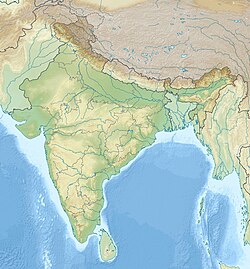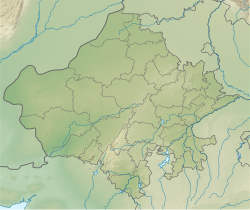Nagari, also Nagri,[2] is a village situated 12 km north of Chittorgarh in Rajasthan state in India. Its ancient name was Madhyamika.[2] It was a flourishing town from the Mauryan period up to Gupta period. The excavations here have shown some ancient archaeological structure with few believed to be religious in nature. The excavated Nagari temple too has been dated to the second half of the 1st-millennium BCE. A large number of punch marked and other old coins have been discovered here.
Nagari | |
|---|---|
village | |
![Dewria balaji in Nagari[1]](http://up.wiki.x.io/wikipedia/commons/thumb/d/d7/Dewria_balaji_nagari.jpg/250px-Dewria_balaji_nagari.jpg) Dewria balaji in Nagari[1] | |
| Coordinates: 24°58′33″N 74°40′57″E / 24.9757°N 74.6825°E | |
| Country | |
| State | Rajasthan |
| Languages | |
| • Official | Hindi |
| Time zone | UTC+5:30 (IST) |
| ISO 3166 code | RJ-IN |
| Vehicle registration | RJ- |
In the 2nd century BC Nagari was probably attacked by the Indo-Greeks who were ruling North-Western of India. As per Patanjali (150 BC) the great grammarian, Madhyamika was besieged by a Yavana king in 150 BC. Patanjali describes in the Mahābhāsya, the invasion in two examples using the imperfect tense of Sanskrit, denoting a recent event:[3]
- "Arunad Yavanah Sāketam" ("The Yavanas (Greeks) were besieging Saketa")
- "Arunad Yavano Madhyamikām" ("The Yavanas were besieging Madhyamika" (the "Middle country").


In the 1st century BC Nagari was probably occupied by the Sibis. Coins of Sibi tribe found here have the legend ‘majhamikaya sibi-janapadasa’.
Nagari came under the influence of Western Kshatrapas in the 2nd century. In the 3rd century Nagari was ruled by Malavas. Later Huna king conquered it.
One stupa has been discovered at Nagari. It is constructed of moulded bricks and decorated with terracotta tiles of high artistic merit.
References
edit- ^ ASI Jaipur circle Nagri
- ^ a b Chakrabarti, Dilip K. (1988). A History of Indian Archaeology from the Beginning to 1947. Munshiram Manoharlal Publishers. p. 87. ISBN 9788121500791.
- ^ "Indo-Greek, Indo-Scythian and Indo-Parthian coins in the Smithsonian institution", Bopearachchi, p16.
- ^ ASI Jaipur circle Hathiwada enclosure
- ^ Thomas, F. w (1921). Epigraphia Indica Vol.16. p. 25.

